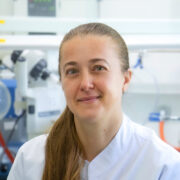
Biographical notes
Dr. Claudia Coronnello received her degree in Physics from Palermo University in 2002. In 2003-2004, she was appointed as “talented” young researcher at ISUFI, Lecce, working within the European Union project titled “Te.S.C.He.T – Technology System for Cultural Heritage and Tourism”. In 2005, she worked at the Palermo University within the European Union Strep project titled “Dysonet -Human behavior through dynamics of complex social networks: an interdisciplinary approach”. Dr. Claudia Coronnello received her PhD degree in Applied Physics by developing a project titled “Gene Ontology statistical analysis of complex diseases: methodological issues and application to Autism” at Palermo University in 2008.
In 2009 she was trained as Bioinformatician at Istituto Mediterraneo per i Trapianti e Terapie ad Alta Specializzazione (ISMETT) in Palermo, Italy within the PERFORMANCE Project. Since the end of 2009, she is part of the Ri.Med. Foundation team, being initially hosted in two different international research Institutions: in 2010-2012, she joined the Benos’ lab as postdoctoral Fellow in the Department of Computational and Systems Biology at the University of Pittsburgh; in 2013-2017, she joined the Giallongo’s lab, in the IRIB-CNR Institution in Palermo, Italy. Now, starting from 2018, she leads the Advanced Data Analysis group of the Ri.MED Foundation.
Scientifical activity
The focus of Dr. Coronnello’s current research is the microRNA activity from several points of view. She explores their function by unravelling the behavior of the RISC proteins, develops novel algorithms to efficiently predict microRNA targets and studies the biological interaction networks among microRNAs and their targets. Specifically, she analyzed transcriptomic data from immunoprecipitation (IP) of two RISC proteins (AGO2 and GW182), in order to understand their role in the microRNA function; she used differentially expressed genes in AGO2 IP and in AGO2 inhibited samples to train ComiR, a novel algorithm useful to predict the targets of a set of endogenous microRNAs; finally, she uses mRNA and microRNA expression profiles to reverse engineering the biological interactions among them.
Given that miRNAs are involved in cancer and other terminal diseases, her algorithms will provide valuable tools in the future in the analysis of clinical miRNA gene expression data. Dr. Coronnello is an expert in -omics data analysis, from raw data to results interpretation, and she shares her activity by developing data analysis workflows and algorithms, where results are obtained by merging information from different sources and experimental techniques. She is currently author of 35 papers published in peer reviewed scientific journals (Scopus h-index: 13).
